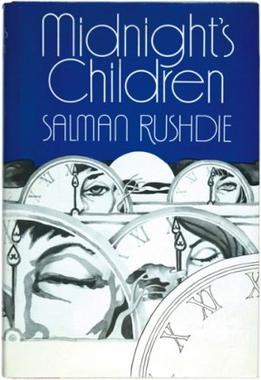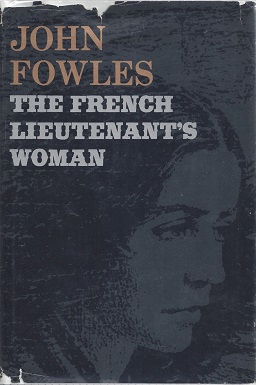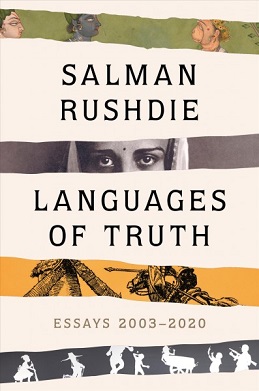
Sir Ahmed Salman Rushdie is an Indian-born British-American novelist. His work often combines magic realism with historical fiction and primarily deals with connections, disruptions, and migrations between Eastern and Western civilizations, typically set on the Indian subcontinent. Rushdie's second novel, Midnight's Children (1981), won the Booker Prize in 1981 and was deemed to be "the best novel of all winners" on two occasions, marking the 25th and the 40th anniversary of the prize.
Magic realism, magical realism, or marvelous realism is a style or genre of fiction and art that presents a realistic view of the world while incorporating magical elements, often blurring the lines between speculation and reality. Magical realism is the most commonly used of the three terms and refers to literature in particular. Magic realism often refers to literature in particular, with magical or supernatural phenomena presented in an otherwise real-world or mundane setting, commonly found in novels and dramatic performances. In his article "Magical Realism in Spanish American Literature", Luis Leal explains the difference between magic literature and magical realism, stating that, "Magical realism is not magic literature either. Its aim, unlike that of magic, is to express emotions, not to evoke them." Despite including certain magic elements, it is generally considered to be a different genre from fantasy because magical realism uses a substantial amount of realistic detail and employs magical elements to make a point about reality, while fantasy stories are often separated from reality. The two are also distinguished in that magic realism is closer to literary fiction than to fantasy, which is instead a type of genre fiction. Magical realism is often seen as an amalgamation of real and magical elements that produces a more inclusive writing form than either literary realism or fantasy.

Midnight's Children is a 1981 novel by Indian-British writer Salman Rushdie, published by Jonathan Cape with cover design by Bill Botten, about India's transition from British colonial rule to independence and partition. It is a postcolonial, postmodern and magical realist story told by its chief protagonist, Saleem Sinai, set in the context of historical events. The style of preserving history with fictional accounts is self-reflexive.

The French Lieutenant's Woman is a 1969 postmodern historical fiction novel by John Fowles. The plot explores the fraught relationship of gentleman and amateur naturalist Charles Smithson and Sarah Woodruff, the former governess and independent woman with whom he falls in love. The novel builds on Fowles' authority in Victorian literature, both following and critiquing many of the conventions of period novels.
Metafiction is a form of fiction that emphasizes its own narrative structure in a way that inherently reminds the audience that they are reading or viewing a fictional work. Metafiction is self-conscious about language, literary form, and story-telling, and works of metafiction directly or indirectly draw attention to their status as artifacts. Metafiction is frequently used as a form of parody or a tool to undermine literary conventions and explore the relationship between literature and reality, life, and art.

The simurgh is a benevolent bird in Persian mythology and literature. It bears some similarities with mythological birds from different origins, such as the phoenix and the humā. The figure can be found in all periods of Iranian art and literature and is also evident in the iconography of Georgia, medieval Armenia, the Eastern Roman Empire, and other regions that were within the realm of Persian cultural influence.

The Satanic Verses is the fourth novel of the Indian-British writer Salman Rushdie. First published in September 1988, the book was inspired by the life of the Islamic prophet Muhammad. As with his previous books, Rushdie used magical realism and relied on contemporary events and people to create his characters. The title refers to the Satanic Verses, a group of Quranic verses about three pagan Meccan goddesses: Allāt, Al-Uzza, and Manāt. The part of the story that deals with the satanic verses was based on accounts from the historians al-Waqidi and al-Tabari.

Postmodern literature is a form of literature that is characterized by the use of metafiction, unreliable narration, self-reflexivity, intertextuality, and which often thematizes both historical and political issues. This style of experimental literature emerged strongly in the United States in the 1960s through the writings of authors such as Kurt Vonnegut, Thomas Pynchon, William Gaddis, Philip K. Dick, Kathy Acker, and John Barth. Postmodernists often challenge authorities, which has been seen as a symptom of the fact that this style of literature first emerged in the context of political tendencies in the 1960s. This inspiration is, among other things, seen through how postmodern literature is highly self-reflexive about the political issues it speaks to.
Hysterical realism is a term coined in 2000 by English critic James Wood to describe what he sees as a literary genre typified by a strong contrast between elaborately absurd prose, plotting, or characterization, on the one hand, and careful, detailed investigations of real, specific social phenomena on the other. It is also known as recherché postmodernism.

Escapist fiction is fiction that provides escapism by immersing readers in a "new world" created by the author. This "new world" aims to compensate for the arbitrariness and the unpredictability of the real one. Typically, an author of escapist fiction offers structure, rationality and resolution to real world problems throughout their medium. The genre facilitates mentalisation; that is, escapist fiction encourages psychological engagement from the reader. Escapist fiction is often contrasted with realism, which confronts the reader with the harsh reality of war, disease, family dysfunction, crime, foreclosure, death, etc. It encompasses a number of different genres within it; any fiction that immerses the reader into a world different from their own is fundamentally escapist fiction. Escapist literature aims to give readers imaginative entertainment rather than to address contemporary issues and provoke serious and critical thoughts.
Historiographic metafiction is a term coined by Canadian literary theorist Linda Hutcheon in the late 1980s. It incorporates three domains: fiction, history, and theory.
Linda Hutcheon, FRSC, OC is a Canadian academic working in the fields of literary theory and criticism, opera, and Canadian studies. She is a University Professor Emeritus in the Department of English and of the Centre for Comparative Literature at the University of Toronto, where she has taught since 1988. In 2000 she was elected the 117th President of the Modern Language Association, the third Canadian to hold this position, and the first Canadian woman. She is particularly known for her influential theories of postmodernism.

The Satanic Verses controversy, also known as the Rushdie Affair, was a controversy sparked by the 1988 publication of Salman Rushdie's novel The Satanic Verses. It centered on the novel's references to the Satanic Verses, and came to include a larger debate about censorship and religious violence. It included numerous killings, attempted killings, and bombings by perpetrators who supported Islam.
Verisimilitude is the "lifelikeness" or believability of a work of fiction. The word comes from Latin: verum meaning truth and similis meaning similar. Language philosopher Steve Neale distinguishes between two types: cultural verisimilitude, meaning plausibility of the fictional work within the cultural and/or historical context of the real world, outside of the work; and generic verisimilitude, meaning plausibility of a fictional work within the bounds of its own genre.
Fawzia Afzal-Khan is a professor of English and director of the Women and Gender Studies Program at Montclair State University. Afzal-Khan received her BA from Kinnaird College for Women, Lahore, Pakistan, and her MA and PhD in English Literature from Tufts University. A University Distinguished Professor, Afzal-Khan was awarded The "Excellence in Public Life Award" by the American Muslim Alliance in 2008. Afzal-Khan also serves on the editorial board of Pakistaniaat: A Journal of Pakistan Studies.

Joseph Anton: A Memoir is an autobiographical book by the British Indian writer Salman Rushdie, first published in September 2012 by Random House. Rushdie recounts his time in hiding from ongoing threats to his life.

The Tailor of Panama is a 1996 novel by British writer John le Carré. A 2001 film was released based on the novel.

Quichotte is a 2019 novel by Salman Rushdie. It is his fourteenth novel, published on 29 August 2019 by Jonathan Cape in the United Kingdom and Penguin Books India in India. It was published in the United States on 3 September 2019 by Random House. Inspired by Miguel de Cervantes's classic novel Don Quixote, Quichotte is a metafiction that tells the story of an addled Indian-American man who travels across America in pursuit of a celebrity television host with whom he has become obsessed.

Languages of Truth is a collection of essays by Salman Rushdie. It was published in May 2021 by Random House.
Uma Parameswaran is an Indo-Canadian writer, scholar, and literary critic. Her writing includes works of fiction and poetry, as well as plays and nonfiction. She is a retired professor of English at the University of Winnipeg.










